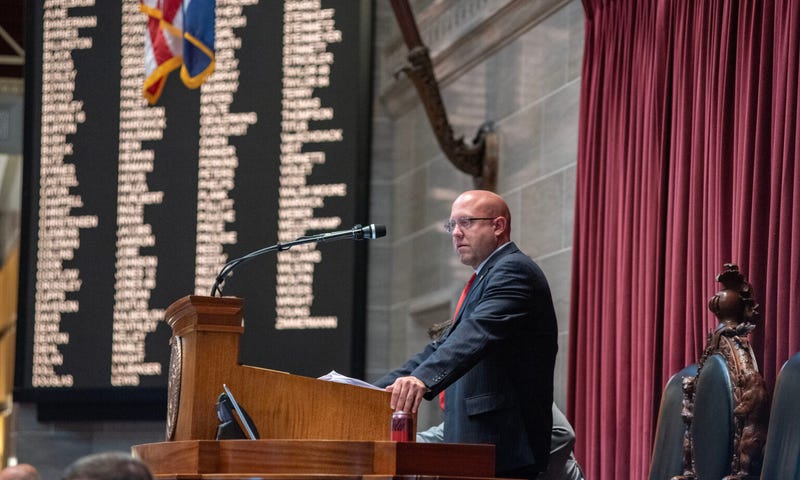
The Missouri House gave initial approval Monday to legislation that would increase the threshold to pass constitutional amendments proposed through initiative petition.
The bill passed largely along partisan lines, with five Republicans voting in opposition. It needs to be approved by the House one more time before heading to the Senate. If it passes that chamber, it goes on the ballot for voter approval.
Under the proposal, constitutional amendments put on the ballot by voters would need a simple majority statewide and a majority in all eight congressional districts to pass. This means that a small percentage of the state’s voters could defeat any ballot measure.
During last year’s general election, 311,915 votes were cast in the 1st District out of the state’s 2,960,266 votes. So 156,000 voters — or about 5.3% of the statewide vote — could prevent a measure from passing.
Constitutional amendments placed on the ballot by state lawmakers would not have the same standard. Only citizen-led initiative petitions would be affected.
The bill initially also targeted changes to state law placed on the ballot through the initiative petition process. But the proposal’s sponsor — Republican state Rep. Ed Lewis of Moberly — said during Monday’s debate that he wanted to “decouple” changes to state statute from constitutional amendments.
“If we’re to change the constitution, there should be broad support,” he said, “support in each congressional district.”
State lawmakers, in concert with changes to the initiative petition process, are considering a new congressional map under a request from President Donald Trump.
The amendment also bans ballot measure campaigns from accepting contributions from foreign nationals, aligning the resolution with Gov. Mike Kehoe’s request.
Earlier this year, the legislature passed a law barring foreign spending on state ballot measures.
State Rep. David Tyson Smith, a Democrat from Columbia, asked why Lewis had this piece in the legislation since the spending is already illegal.
Lewis said it would add the restrictions to the Missouri Constitution, whereas they are currently only enacted in state law.
Smith labeled the provision “ballot candy” aimed at tricking voters into supporting changing the initiative petition process.
“It is extremely sloppy when it talks about foreign adversaries,” he said. “But the reason it was left in here is for ballot candy.”
The proposed summary that would appear on the ballot next year leads with a ban on foreign nationals “providing funding to influence ballot measure elections.”
Through recent ballot measures, Missourians have legalized abortion and recreational use of marijuana and voted to increase the minimum wage and mandate paid-sick leave. In November, the abortion-rights amendment passed with just shy of 52% of the vote with large support from the state’s urban, more-populated areas. Voters in all but eight of Missouri’s 115 counties opposed the amendment.
Initiative petitions in recent years, Lewis said, have been “controversial and partisan,” specifically calling out the marijuana and abortion amendments.
Lewis has been sponsoring legislation to raise the threshold to pass initiative petitions since 2021, when he proposed raising the minimum amount of signatures required to certify petitions.
Earlier this year, Missouri Republicans championed a resolution that would have required a majority of votes in five out of eight congressional districts. Kehoe, in his request for a special legislation session, asked for a majority in all districts.
“Everyone knows it is too strict,” Smith told Lewis during the floor debate. “Even your own party knows it is too strict.”
House Republicans filed amendments, which were not presented Monday, with less rigorous standards than Lewis’.
State Rep. John Simmons, a Republican from Washington, filed an amendment that would have required three-fourths of districts.
State Rep. Rudy Veit, a Republican from Wardsville, proposed raising the minimum for approval from a simple majority to 55% of voters statewide. His proposed amendment did not include requirements for a majority in constitutional districts.
Veit was one of five Republicans who voted against the bill on Monday. The others were state Reps. Bill Hardwick of Dixon, Mazzie Christensen of Bethany, Chris Brown of Kansas City and Dave Griffith of Jefferson City.
Missouri Independent is part of States Newsroom, a nonprofit news network supported by grants and a coalition of donors as a 501c(3) public charity. Missouri Independent maintains editorial independence. Contact Editor Jason Hancock for questions: info@missouriindependent.com.
